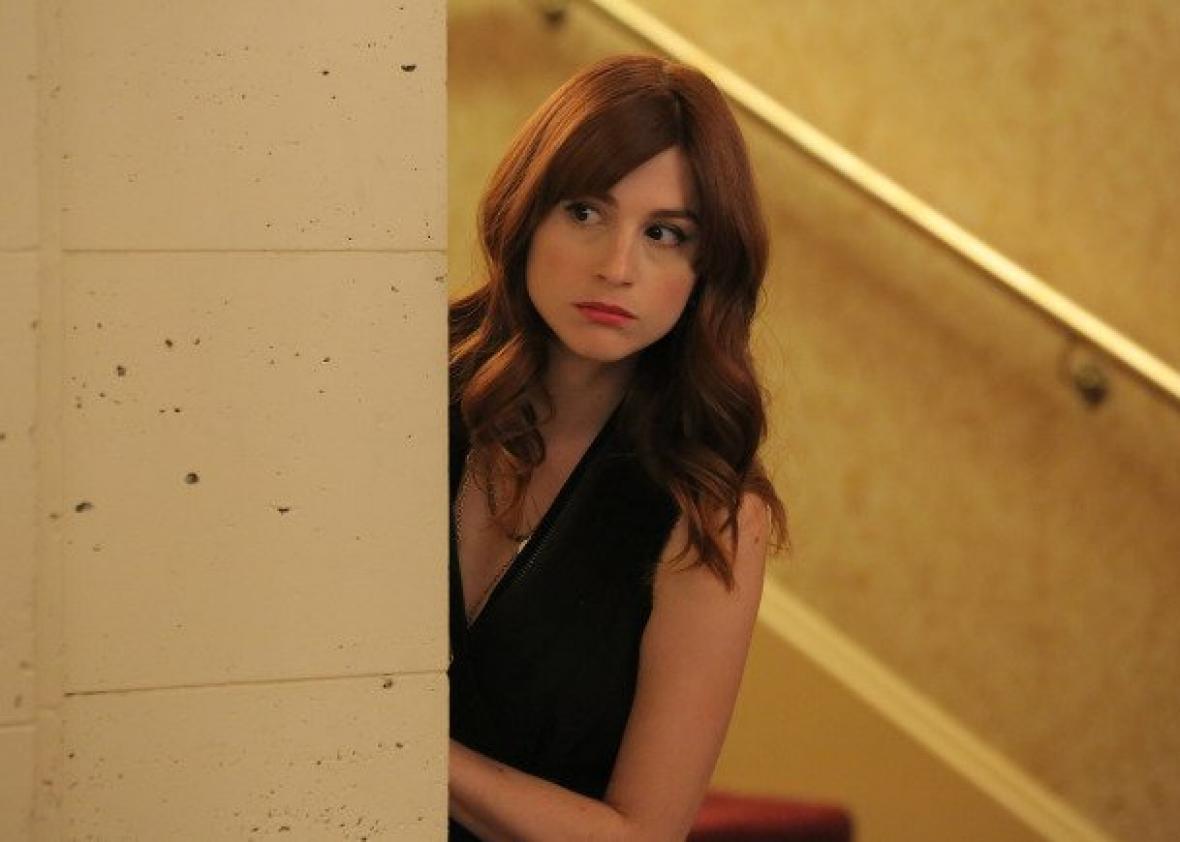You’re the Worst, a romantic comedy about the impossibility of romance, finished its deliciously sour first season with reluctant lovebirds Gretchen (Aya Cash) and Jimmy (Chris Geere) moving in together. The two often perform their love as lite sadism, lashing out, behaving badly because they believe love to be the ultimate act of masochism, something guaranteed to cause great pain, eventually.
Given Gretchen and Jimmy’s feelings about love, relationships, monogamy—impossible, ridiculous, naive—their cohabitation was, in its way, ultra-romantic: What’s more romantic than beginning something you know is doomed? Still, they insisted on behaving as though it wasn’t romantic at all. Gretchen keeps most of her things in a garbage bag.
The first few episodes of the show’s second season, currently ongoing, felt a little contrived. Jimmy and Gretchen don’t want to be a regular couple, because being regular is dull and daft. But here they were, living together like a regular couple. They freaked out in various ways, including doing drugs every night rather than simply sleep next to one another like normals. As much as they loathe standard relationship behavior, their resistance to certain aspects of coupledom felt forced, less a result of their hang-ups than those of their TV shows. You’re the Worst, like its protagonists, strives to distinguish itself from other romantic comedies. But it put its characters into a circumstance where eschewing standard romantic comedy behavior became unrealistic, and felt less like what Jimmy and Gretchen would do, and more what the writers’ shtick demanded.
Then came Gretchen’s depression.
In the last decade or so, at least since the British version of The Office became a phenomenon, comedies have gotten much more comfortable with drama. I’m not just taking about Girls and Louie and Transparent, half-hour shows that we call comedies because none of the other words for them seem to stick. (Dram-coms, anyone? I didn’t think so.) I’m talking about straight-up comedies—shows as varied as the American version of The Office, Fox’s Last Man on Earth, and even ABC’s prematurely cancelled Selfie—developing stories over multiple episodes that pay off with emotional arcs not explored primarily for laughs. (Jim and Pam’s marriage trouble is a good example.)
A few episodes into the new season of You’re the Worst, we began to see Gretchen sneaking out of bed late at night. For weeks we don’t know where she is going, until Jimmy finally becomes convinced she is stepping out on him. He tracks her down only to discover that every night she is going to her car to sob. Gretchen, it turns out, is at the beginning of a serious depressive episode, something that, per a conversation she had with the helium-voiced, sulfur-souled Lindsay, had happened before. Unlike all their other cohabitation problems, nothing about Gretchen’s depression feels contrived at all. It even explains a lot about Gretchen’s perspective on relationships. Like her, inevitably, they hurt.
The episodes that have followed have been showcases for Aya Cash, who has done a heartbreaking job portraying a woman experiencing the world as if through bubble wrap. In last night’s episode, Cash was able to perfectly distinguish between Gretchen, artificially hepped up on Adderall and coke, and previous iterations of Gretchen, authentically hepped up on sex and happiness. A recent episode focused largely on another couple, played by Justin Kirk and Tara Summers, who seemed so enviably happy—married, with a kid and a dog and a nice house, but still cool, still sleeping together—that Gretchen found some momentary relief pretending to be them. But this fantasy come crashing down when she realized they too, were discontented: Cash’s face expressed true despair.
The episodes have been less impressive for Jimmy, who has become more of a caricature as Gretchen has become more real. Gretchen told Jimmy about her depression, and demanded that he not try to fix her. He’s made some attempts to do so anyway, trying to assemble a perfect day for her, but he’s made no effort to actually understand what’s going on with her. He’s so willfully clueless about her situation, he kicked Gretchen out of a bar where he’s playing darts, because the darts are part of his writing process: His procrastination still trumps her loneliness. While Gretchen has receded into her misery, Jimmy has started a flirtation with a cool bartender, who, because he doesn’t know her very well, currently seems baggage-free.
But even Jimmy’s amped-up cartoonishness works for the show. It accentuates the distance between Gretchen and Jimmy, one numbed out in a drama, the other shrieking through a dirty comedy. (In the episode with the aforementioned couple, Gretchen invites Jimmy to meet them. Watching, I had the feeling, one I’ve only ever had in real life before, of suddenly seeing Jimmy through a stranger’s eyes—and being utterly mortified. What an awful prat.)
Not everything about this depression storyline quite makes sense. Jimmy and Gretchen are part of Los Angeles’ creative class, which means they probably know dozens of people with mood disorders, most maintained by pharmaceuticals. (This is not even including their roommate Edgar, a former heroin addict and war veteran suffering from PTSD.) Gretchen, who as of last night was self-medicating with Adderall, would have a psycho-pharmacologist and a Lexapro script.
But as a strictly dramatic device, the storyline has been excellent, the best dramatization of depression I’ve seen on television and a hurdle worthy of Gretchen and Jimmy. The two of them, together, decided that in their relationship they don’t talk that about their feelings and they don’t do things they don’t want to do. These are rules that protect them from being like everyone else. But in this moment of crisis, the rules don’t protect them from, or for, each other.
